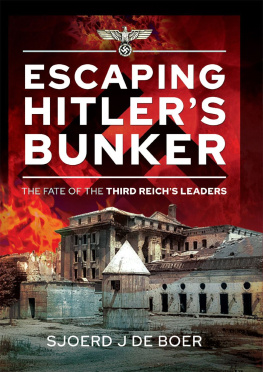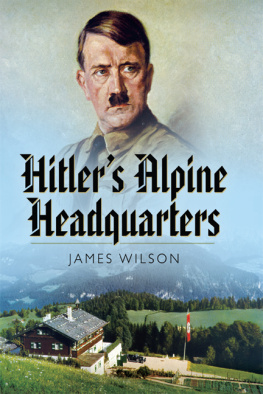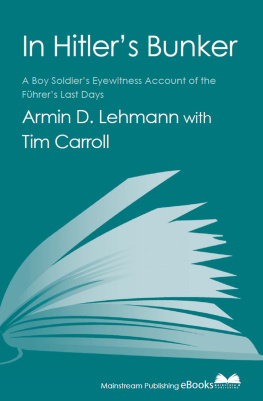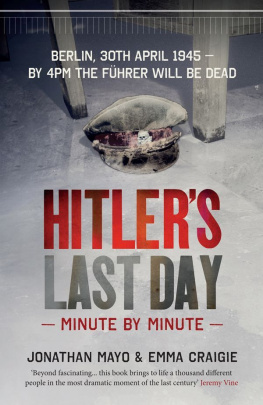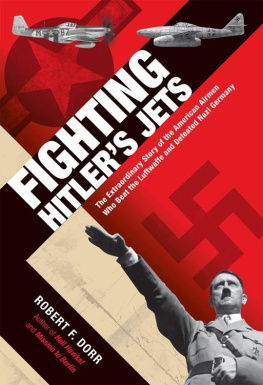EUMENES Publishing 2019, all rights reserved. No part of this publication may be reproduced, stored in a retrieval system or transmitted by any means, electrical, mechanical or otherwise without the written permission of the copyright holder.
Publishers Note
Although in most cases we have retained the Authors original spelling and grammar to authentically reproduce the work of the Author and the original intent of such material, some additional notes and clarifications have been added for the modern readers benefit.
We have also made every effort to include all maps and illustrations of the original edition the limitations of formatting do not allow of including larger maps, we will upload as many of these maps as possible.
GERMANY IN DEFEAT
Percy Knauth
Germany in Defeat was originally published in 1946 by Alfred A. Knopf, New York.
* * *
TO
the memory of my friend and teacher
RALPH W. BARNES
who died in the line of journalistic duty
at Bitolj, Yugoslavia, in dark days of the war
Preface
There probably could be no more devastating experience in a human lifetime than to be suddenly set down, coming from the security and plenty of America, in the utter physical and moral ruin of Germany today. It is a transition not only from a land where houses still have walls and panes of glass and running water and heat in the wintertime and a hot meal cooking on the stove to a land that has none of these thingsit is a passage from a state of mind in which all these things seem normal and entirely essential to a life in which they seem like memories from a long-forgotten time, a life that does not even hold a hope of them, or, for that matter, any hope at all. For Germany is not only a ruined land (there are other ruined lands in Europe, some worse destroyed than Germany); it is also a defeated land, a nation that no longer calls its life its own.
When I arrived in Frankfurt-on-the-Main on March 18, 1945, I was about 28 hours away from New Yorkor three meals and a nights sleep distant from my Connecticut home. Frankfurt was the first German city I had seen in four years. Berlin had been the last. On March 18, 1941, I left the German capital with my wife, homeward-bound after four years of newspaper work in Germany and Central Europe. That journey home was long and arduous. Six months were gone before we finally rounded into New York harbor and breathed the free air of America. Visas, difficulties in securing transportation, the birth of our first son, and two major campaigns of the Wehrmacht delayed our travel. We spent that summer in Switzerland, the listening post on Germanys frontier from which I broadcast news for the Columbia Broadcasting System and wrote dispatches for the New York Times .
Those years had been eventful and, for the world, decisive. When I arrived in Berlin with a four-year education in Switzerland and Germany, plus a year and a half of reporting on a smalltown newspaper to back up my claims that I was fit material to become a foreign correspondent, the Axis was an embryo about to be born. The German pocket battleship Deutschland in that summer bombarded Almeria, giving me my first fearful sense of international crisis. Later, the death of Rudolf Carraciola, Germanys best-beloved racing driver, was an occasion for national mourning and the world seemed on its normal plane again. But then came Mussolini, to visit Hitler and speak in the Olympic Stadium (with a bad cold that made his voice ridiculously human), and a trial blackout for Berlin. Once more the possibility of a war seemed something less than just a fairy tale, for now the sides were chosen: the Berlin-Rome Axis was born.
In March 1938 I visited my brother down in Weimar and had a carefree time. The world was calm again, or at least calm enough for people to persuade themselves that things would turn out all right in the end. And then one night a telephone call from Berlin: Get back up here, Austria is going to be invaded. Next day I saw the war parading southward past me as I drove north along the Autobahntanks, trucks, buses full of soldiers, guns, airplanes: the fledgling Wehrmacht on its first mission of aggrandizement. From that time on, the world was never normal again. September 1, 1939, was only the moment that all of us had so long awaited. It was almost a relief when the period of wishful thinking and appeasement ended.
By March 1941, like many others in the American press colony, I had had enoughenough of being bombed by British fliers to whom, in our hearts, we wished all luck as we took shelter from their bombs; enough of listening to Nazi propagandists telling us what we should write of Germanys greatness; enough of being checked on day and night by the Gestapo shadowers. I had a wife nowa French girl who was interned when war broke out, released, and then interned again. The second time it took me three months to get her free, and when she got back to Berlin we married. When we discovered shortly after that a baby was on the way, we finally made up our minds that life was not worth living with the Berlin Blues; and so, still fearful lest at the last minute the Gestapo might catch up with my wifes unauthorized news correspondents exit visa, we left Germany without a backward glance.
Now, four years later, I was there again. In the interim I had worked a years hitch in New York on the Times Sunday Section, had transferred to Time Magazine, where I wrote in the Foreign News department, and had done a stint in the Middle East, Turkey, Rumania, Bulgaria, and the Aegean Sea. In those four years I had never been able to tear my thoughts completely away from Germany; having seen that nation in the time of its greatest victories, I could not help wondering how the Germans thought and acted under the increasing pressure of reverses and inevitable defeat.
Last spring I got my chance to find out when I was sent into the Reich behind the invading Allied armies to report on Germanys downfall for Time and Life magazines. For the opportunity given me by their editors to see the end in Germany I owe a debt of great professional gratitude. Much of what I saw has already been published in the pages of those two magazines. With their permission, for which I am likewise most grateful, I have used that material in this book, plus a great deal more which in those hectic days never got beyond the stage of hurried notes. I have written the book in the sincere hope that all of us will not too easily or too quickly forget how terrible are the wages of aggressive war.
Wilton, Connecticut, November, 1945
I. The Ruins
In the hush of early dawn, the city of Frankfurt-on-the-Main lay as still and lifeless as a medieval ruin. It was cold, and a drizzling rain shrouded all things in unrelieved gray. All up and down the street on which I stood, the houses were vacant, crumbling shells. Far down at one end, a line of U.S. Seventh Armored Division tanks crouched in the shelter of a wall, their hatches battened down, their crews somewhere invisibly asleep. Only one figure moved in all that silence: a sentry, helmeted and muffled against the cold and rain, shuffling slowly up the street, a colorless shadow in a ruined world.
Beyond the row of houses, in little gardens of flower beds and fruit trees, the fog of the night before still hung above the grass. I climbed the steep sides of a railroad embankment and walked along the tracks, rusty from long disuse, broken and twisted here and there by bombs. There was a line of freight cars, splintered and charred, their contents strewn about the ground. On two big flatcars there were mounted guns, their barrels sleek and dripping in the rain. Barrels, breeches, and all, they were still thickly coated with protective grease and factory-new. Frankfurt had fallen before they could be fired.



